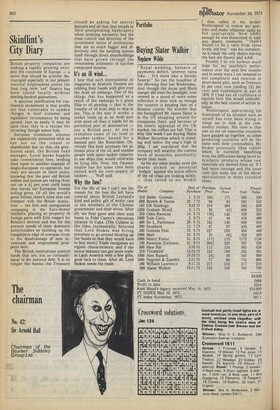Skinflint's City Diary
British property companies are making a rapidly growing entry into the continent of Europe — a move that should be actively discouraged especially in our present national helplessness unless the final long term 'out' finance has been raised locally without sterling-backed guarantees.
A specious justification for continental investment is that profits are less vulnerable to sudden changes in local economic and legislative circumstance by being spread. Just as easily it may be said that this is a recipe for recurring though minor loss.
European investment schemes are expensively promoted with an eye not on the tenant or shareholder but on that old greyhaired saint, the British fund manager. Local banks happily take commitment fees, lending their name to another example of Anglo-European co-operation, but they are secure in their seats; knowing that the poor old British widow and parson are taking them out on a 41 per cent yield basis that leaves our European friends hiding grins. Of all the world's great heroes, there's none that can compare with the British Institution — tax free and unregulated rampaging in the Euro-money markets, playing at property in foreign parts with little respect for Britain's interest and less for the present needs of their domestic policyholders by building up the competitive edge of overseas rivals to the disadvantage of new investment and employment prospects here.
The British institutions control funds that are, not so curiously, equal to the national debt. It is no longer the banks the Treasury should be asking for special deposits and all that that entails in their precipitating bankruptcy when scenting necessity, but the close control and direction of the investment ratios of institutions that are so much bigger and effectively own the banking system itself through direct shareholdings that have grown through the remorseless arithmetic of tax-free compound interest.
It's an ill wind...
I hear that such international oil magnates as Aristotle Onassis are rubbing their hands with glee over the Arab oil embargo. One of the things that has happened as a result of the embargo is a great fillip to oil pirating — that is, the transfer of oil from ship to ship at sea. This is the way it works: a tanker loads up at an Arab port with more oil than it needs for its permitted port of destination — say a British port. At sea it transfers some of its load to another tanker, bound for a banned port like Rotterdam. Obviously this both increases the ultimate price of the oil, and enables people with spare tanker capacity to use ships that would otherwise be lying idle. Now, the Onassis empire has for some time been cursed with an over-supply, of tankers . . 'Nuff said.
*Why the fuss?
For the life of me I can't see the reason for the fuss the left have created about British Leyland's kind and politic gift of motor cars to the members of the Chilean government and their wives. After all, we first gave and then sold buses to Fidel Castro's obnoxious tyranny in Cuba. (The Cubans at the time, incidentally, believed that Lord Stokes was hiring terrorists to go around blowing up the 'buses so that they would have to buy more.) Trade recognises no regime characteristics: and if the motor industry can get more trade in Latin America with a few gifts, good luck to them. After all, Lord Stokes needs the trade.


































 Previous page
Previous page